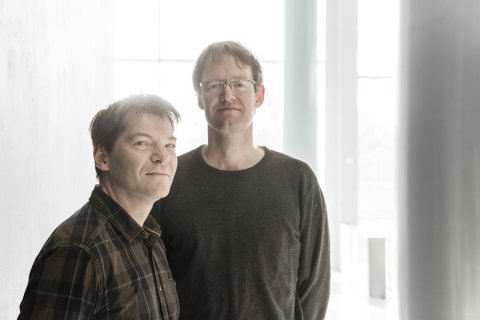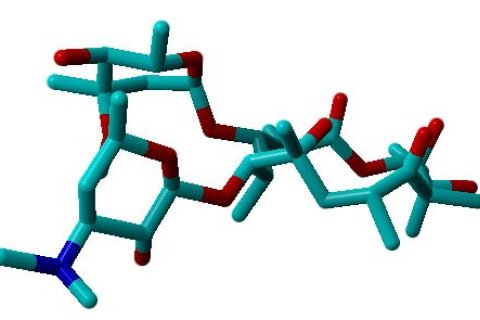Sugars give antibiotics a second chance
Life Sciences
Resistance to antibiotics is a growing, urgent problem that requires new and better alternatives. Many newly discovered antibacterial agents never reach the market because they are either too toxic, poorly soluble or prove unstable. The Utrecht-based researchers Marc Wösten and Roland Pieters are going to give these written-off antibiotics a second chance by providing them with sugars. In 2015 they received a Seed Money Grant to develop a proof of concept.

Antibiotics are one of the greatest discoveries of the twentieth century. The discovery of the ‘miracle cure’ penicillin by Britain’s Alexander Fleming marked a breakthrough in the fight against bacterial infections. However, the widespread use of antibiotics also appears to have a major disadvantage: The relatively strong bacteria that survive the medicine will continue to multiply and thus create ‘offspring’ which are resistant to the antibiotic used. There are now bacteria that are resistant to many common antibiotics, such as the well-known ESBL-producing, MRSA and VRE bacteria.
Chemistry
“I have long been fascinated by the antibiotics problem,” says Dr Marc Wösten, molecular microbiologist at the Faculty of Veterinary Medicine of the University of Utrecht. “I wanted to do something about it. New antibiotics are continuously being discovered, but many never reach the finish line because they don’t have the right properties. They are, for example, too toxic or dissolve poorly in water. And they may be broken down too quickly in the host or by bacteria.”
“I came up with the idea of chemically fine-tuning an antibiotic so that it acquires other properties. This can be done by attaching sugars to the molecule, or by replacing an existing sugar group by another sugar. As a result, the substance becomes, for example, less toxic, more soluble or less degradable. To achieve this, I needed a chemist, so I got in touch with Roland.”

Challenge
“My specialty is protein-carbohydrate interactions,” says Prof. Roland Pieters, chemist at the Department of Pharmaceutical Sciences of Utrecht University. “It’s becoming increasingly clear that sugars play a significant roles when attached to antibiotics. Therefore, I'm going to link different carbohydrates to antibiotics to see what the effect is. This is quite a challenge, because you don’t want to reduce the effectiveness of the antibiotic. So you have to choose the right combinations.”
“I will then test the modified substances in cells and tissues,” continues Wösten. “After that, I’ll look at the activity, solubility and toxicity, among other things. As soon as we have a proof of concept, we’ll see whether industry is interested. Then we can begin testing on animals and humans. Pets and farm animals can also benefit from this, because antibiotic resistance is a major problem in the agricultural sector as well.”
Cross-fertilisation
“This means we can give written-off antibiotics a second chance,” says Pieters. “The Seed Money Grant we received is a tremendous help here. It’s really a godsend. Even with the many requests that unfortunately did not make it in this round, it ensures contact between researchers and cross-fertilisation between different disciplines.”
The duo is also very pleased to be in Utrecht. Pieters: “Nowhere else will you find a larger group of Life Sciences within walking distance: Natural Science, Veterinary Medicine, University Medical Centre Utrecht, and now also Danone and soon the RIVM. It is increasingly becoming a Life Sciences centre and that attracts companies.”
This publication is closely related to Utrecht University’s strategic research theme Life Sciences, under the sub-theme Public Health.
Text: Roy Keeris
Second call Seed Money
In 2015 four research projects were approved in the second call Seed Money Life Sciences. The researchers who received a grant in the second call are:
- Antimicrobial drugs optimization by decoration with non-natural sugar variants - Marc Wösten (Veterinary Medicine) / Roland Pieters (Science)
- Modified autologous prostasomes as a vaccine for prostate cancer - Willem Stoorvogel (Veterinary Medicine) / Marianne Boes (Medicine)
> Read more in the article In search of a vaccine against prostate cancer
- Human lung organoids: a novel model to understand respiratory syncytial virus Bronchiolotis - Louis Bont (Medicine) / Norman Sachs (Hubrecht Institute)
> Read more in the article Growing ‘mini-lungs’ in the fight against child mortality
- Metabolic Requirements for genome integrity in adult stem cells - Boudewijn Burgering (Medicine) / Ruben van Boxtel (Hubrecht Institute)
> Read more in the article Improving the quality of stem cells for new organs

